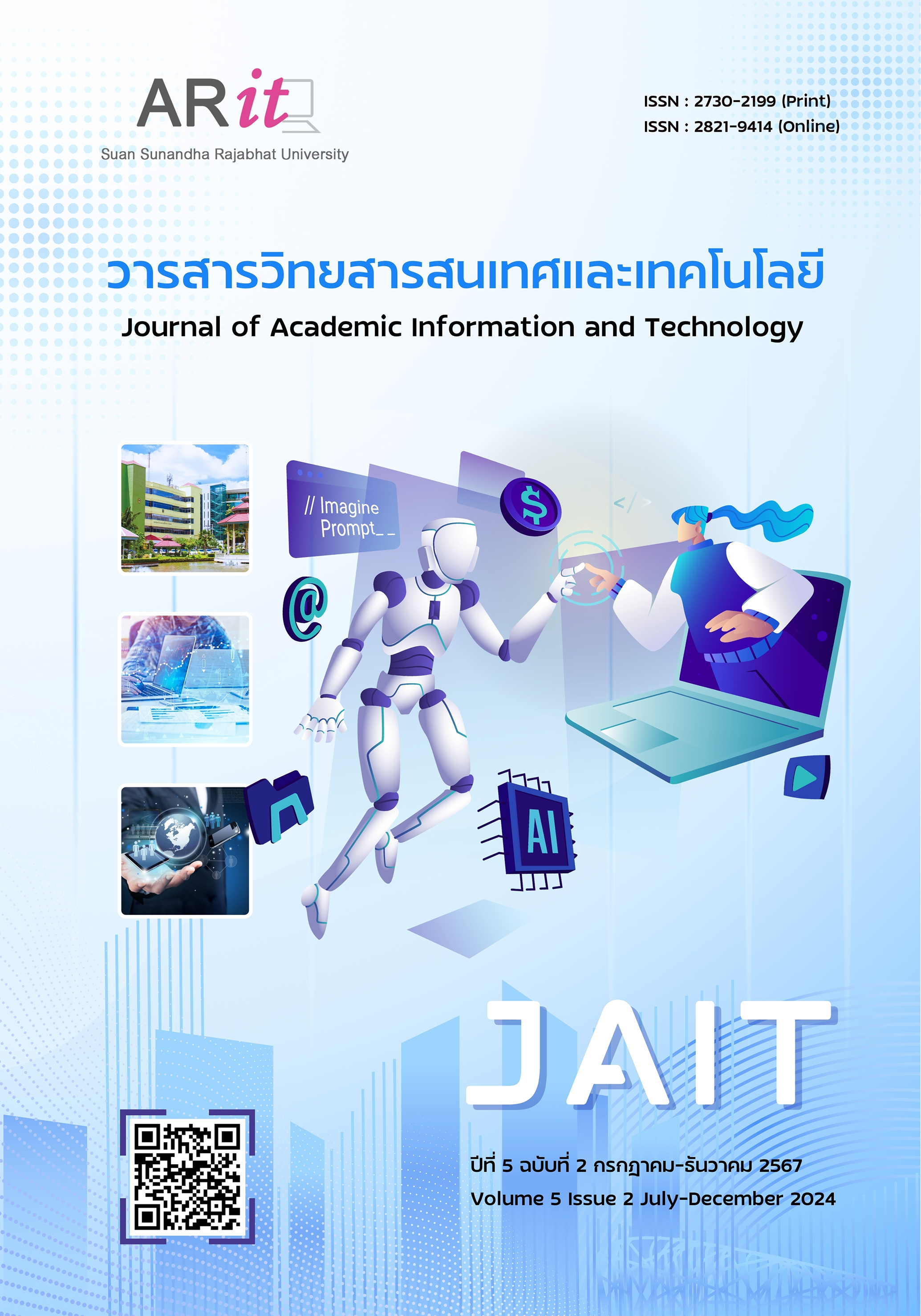ปัจจัยที่ส่งผลต่อการนำเทคโนโลยีดิจิทัลมาใช้เพื่อเปลี่ยนผ่านสู่ดิจิทัลของมหาวิทยาลัยในประเทศไทย
คำสำคัญ:
เทคโนโลยีดิจิทัล, การเปลี่ยนผ่านสู่ดิจิทัล, ปัจจัยที่ส่งผลต่อการนำเทคโนโลยีดิจิทัลมาใช้บทคัดย่อ
การเปลี่ยนผ่านสู่ดิจิทัลมีความสำคัญสำหรับมหาวิทยาลัย แต่การดำเนินการนั้นยังคงเป็นความท้าทาย มหาวิทยาลัยแต่ละแห่งมีการนำเทคโนโลยีดิจิทัลมาใช้เพื่อเปลี่ยนผ่านสู่ดิจิทัลแตกต่างกัน มีทั้งนำมาใช้อย่างเป็นระบบในทุกส่วนงานและนำมาใช้ในบางส่วนงาน งานวิจัยที่ผ่านมาได้ศึกษาปัจจัยที่ส่งผลต่อการนำเทคโนโลยีดิจิทัลใช้ในองค์กรประเภทต่าง ๆ แต่ในองค์กรด้านการศึกษายังมีอยู่จำกัด โดยเฉพาะมหาวิทยาลัยในประเทศไทย งานวิจัยนี้จึงมีวัตถุประสงค์เพื่อศึกษาปัจจัยที่ส่งผลต่อการนำเทคโนโลยีดิจิทัลมาใช้เพื่อเปลี่ยนผ่านสู่ดิจิทัลของมหาวิทยาลัยในประเทศไทย ซึ่งเป็นการวิจัยเชิงสำรวจโดยใช้วิธีการวิจัยเชิงปริมาณ และใช้แบบสอบถามเป็นเครื่องมือในการเก็บรวบรวมข้อมูลจากมหาวิทยาลัยในประเทศไทยจำนวน 63 แห่ง สถิติที่ใช้ในการวิเคราะห์ข้อมูลได้แก่ สถิติเชิงพรรณนา คือ ค่าร้อยละ ค่าเฉลี่ย ค่าเบี่ยงเบนมาตรฐาน และสถิติเชิงอนุมานเพื่อทดสอบสมมติฐานการวิจัยคือ วิเคราะห์ค่าสหสัมพันธ์ด้วยวิธีของเพียร์สัน และการวิเคราะห์การถดถอยเชิงพหุคูณ ผลการวิจัยพบว่าความพร้อมของโครงสร้างพื้นฐานด้านไอที ความสอดคล้อง ประโยชน์ การสนับสนุนของผู้บริหารระดับสูง การสนับสนุนของผู้จำหน่ายเทคโนโลยี การสนับสนุนจากภาครัฐ และความกดดันจากการแข่งขันเป็นปัจจัยสำคัญในการนำเทคโนโลยีดิจิทัลมาใช้ในมหาวิทยาลัย ส่วนความซับซ้อนของเทคโนโลยีและต้นทุนเป็นอุปสรรคในการนำเทคโนโลยีดิจิทัลมาใช้ในมหาวิทยาลัย ผู้บริหารมหาวิทยาลัยสามารถใช้ผลการวิจัยนี้เพื่อทำความเข้าใจว่าปัจจัยใดมีแนวโน้มที่จะเอื้ออำนวยต่อการนำเทคโนโลยีดิจิทัลมาใช้งานเพื่อเปลี่ยนผ่านสู่ดิจิทัลของมหาวิทยาลัยได้มากที่สุด ซึ่งจะเป็นประโยชน์ต่อการวางแผน และตัดสินใจในการนำเทคโนโลยีดิจิทัลมาใช้เพื่อเปลี่ยนผ่านสู่ดิจิทัล
เอกสารอ้างอิง
ธนชาติ นุ่มนนท์. (2562, 26 กรกฎาคม). ดิจิทัลทรานส์ฟอร์เมชั่น “ภาคการศึกษา.” กรุงเทพธุรกิจ. https://www.bangkokbiznews.com/blogs/columnist/122751
บุญชม ศรีสะอาด. (2545). การวิจัยเบื้องต้น. สุวีริยาสาส์น.
Al Hadwer, A., Tavana, M., Gillis, D., & Rezania, D. (2021). A systematic review of organizational factors impacting cloud-based technology adoption using technology-organization-environment framework. Internet of Things, 15, Article 100407. https://doi.org/10.1016/j.iot.2021.100407
Al-Khatib, A. W. (2023). Drivers of generative artificial intelligence to fostering exploitative and exploratory innovation: A TOE framework. Technology in Society, 75, Article 102403. https://doi.org/10.1016/j.techsoc.2023.102403
Ansong, E., Boateng, S. L., & Boateng, R. (2017). Determinants of e-learning adoption in universities: Evidence from a developing country. Journal of Educational Technology Systems, 46(1), 30–60. https://doi.org/10.1177/0047239516671520
Arumugam, A., Khazaei, H., Bhaumik, A., & Kanesan, T. (2022). Analysing the factors influencing digital technology adoption in manufacturing sectors: Leadership effectiveness as a mediator. WSEAS Transactions on Business and Economics, 19, 1764-1787. https://doi.org/10.37394/23207.2022.19.159
Awa, H. O., Ukoha, O., & Emecheta, B. C. (2016). Using T-O-E theoretical framework to study the adoption of ERP solution. Cogent Business & Management, 3(1), Article 1196571. https://doi.org/10.1080/23311975.2016.1196571
Benavides, L. M. C., Arias, J. A. T., Serna, M. D. A., Bedoya, J. W. B., & Burgos, D. (2020). Digital transformation in higher education institutions: A systematic literature review. Sensors, 20(11), Article 3291. https://doi.org/10.3390/s20113291
Cagliano, A. C., Mangano, G., & Rafele, C. (2021). Determinants of digital technology adoption in supply chain. An exploratory analysis. Supply Chain Forum: An International Journal, 22(2), 100–114. https://doi.org/10.1080/16258312.2021.1875789
Drazin, R. (1991). The processes of technological innovation. The Journal of Technology Transfer, 16(1), 45–46. https://doi.org/10.1007/BF02371446
Faria, J. A., & Nóvoa, H. (2017). Digital transformation at the University of Porto. In S. Za, M. Drăgoicea, & M. Cavallari (Eds.), Lecture notes in business information processing: Vol. 279.Exploring services science (pp. 295-308). Springer. https://doi.org/10.1007/978-3-319-56925-3_24
Fitzgerald, M., Kruschwitz, N., Bonnet, D., & Welch, M. (2014). Embracing digital technology: A new strategic imperative. MIT Sloan Management Review, 55(2), 1-12.
Hasani, T., O’Reilly, N., Dehghantanha, A., Rezania, D., & Levallet, N. (2023). Evaluating the adoption of cybersecurity and its influence on organizational performance. SN Business & Economics, 3, Article 97. https://doi.org/10.1007/s43546-023-00477-6
Hashim, M. A. M., Tlemsani, I., & Matthews, R. (2022). Higher education strategy in digital transformation. Education and Information Technologies, 27, 3171–3195. https://doi.org/10.1007/s10639-021-10739-1
Kumar, A., & Krishnamoorthy, B. (2020). Business analytics adoption in firms: A qualitative study elaborating TOE framework in India. International Journal of Global Business and Competitiveness, 15, 80–93. https://doi.org/10.1007/s42943-020-00013-5
Liu, D.-Y., Chen, S.-W., & Chou, T.-C. (2011). Resource fit in digital transformation: Lessons learned from the CBC Bank global e-banking project. Management Decision, 49(10), 1728–1742. https://doi.org/10.1108/00251741111183852
Mahmood, T., & ur Rehman, U. (2023). Digital technology implementation and impact of artificial intelligence based on bipolar complex fuzzy Schweizer–Sklar power aggregation operators. Applied Soft Computing, 143, Article 110375. https://doi.org/10.1016/j.asoc.2023.110375
Malik, S., Chadhar, M., Vatanasakdakul, S., & Chetty, M. (2021). Factors affecting the organizational adoption of blockchain technology: Extending the technology–organization–environment (TOE) framework in the Australian context. Sustainability, 13(16), Article 9404. https://doi.org/10.3390/su13169404
Nikopoulou, M., Kourouthanassis, P., Chasapi, G., Pateli, A., & Mylonas, N. (2023). Determinants of digital transformation in the hospitality industry: Technological, organizational, and environmental drivers. Sustainability, 15(3), Article 2736. https://doi.org/10.3390/su15032736
Oh, K., Kho, H., Choi, Y., & Lee, S. (2022). Determinants for successful digital transformation. Sustainability, 14(3), Article 1215. https://doi.org/10.3390/su14031215
Oliveira, T., Thomas, M., & Espadanal, M. (2014). Assessing the determinants of cloud computing adoption: An analysis of the manufacturing and services sectors. Information & Management, 51(5), 497–510. https://doi.org/10.1016/j.im.2014.03.006
Rababah, K. A., Al-Nassar, B. A., & Al-Nsour, S. N. (2020). Factors influencing the adoption of cloud computing in small and medium enterprises in Jordan. International Journal of Cloud Applications and Computing, 10(3), 96–110. http://doi.org/10.4018/IJCAC.2020070106
Salim, T. A., El Barachi, M., Mohamed, A. A. D., Halstead, S., & Babreak, N. (2022). The mediator and moderator roles of perceived cost on the relationship between organizational readiness and the intention to adopt blockchain technology. Technology in Society, 71, Article 102108. https://doi.org/10.1016/j.techsoc.2022.102108
Shahadat, M. M. H., Nekmahmud, Md., Ebrahimi, P., & Fekete-Farkas, M. (2023). Digital technology adoption in SMEs: What technological, environmental and organizational factors influence in emerging countries? Global Business Review. https://doi.org/10.1177/09721509221137199
Wekerle, C., Daumiller, M., & Kollar, I. (2020). Using digital technology to promote higher education learning: The importance of different learning activities and their relations to learning outcomes. Journal of Research on Technology in Education, 54(1), 1–17. https://doi.org/10.1080/15391523.2020.1799455
Yin, W. (2023). Does digital transformation matter to green innovation: Based on TOE framework and configuration perspective. Environmental Science and Pollution Research, 30(44), 100046–100057. https://doi.org/10.1007/s11356-023-29438-0



